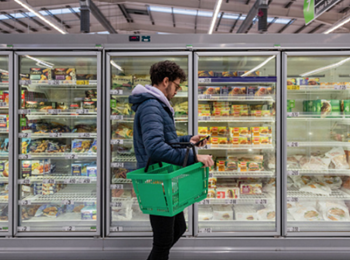By: Carol Abel, Vice President, Education Program Development, FMI
 Supermarket refrigeration systems are on the cusp of major change following passage of the the AIM (American Innovation & Manufacturing) Act. The AIM act directs EPA to spearhead phasedown of HFC (hydrofluorocarbon) production and use by 85% by 2035. California, Washington State and New York have even more aggressive regulations. Transitioning to new refrigeration technology is a significant and expensive undertaking for retailers.
Supermarket refrigeration systems are on the cusp of major change following passage of the the AIM (American Innovation & Manufacturing) Act. The AIM act directs EPA to spearhead phasedown of HFC (hydrofluorocarbon) production and use by 85% by 2035. California, Washington State and New York have even more aggressive regulations. Transitioning to new refrigeration technology is a significant and expensive undertaking for retailers.
HFCs are greenhouse gasses used heavily in industries that rely on commercial-scale refrigeration, such as the food retail industry. HFCs are considered one of the most potent drivers of climate change due to their high global-warming potential (GWP). The emissions of a single supermarket may equal the carbon dioxide emissions of 300 cars.
Transitioning to a cooling system that does not use HFCs is a significant financial investment costing more than $1 million per store. Additionally, as HFCs are phased out, the price per pound of refrigerants will increase and the expense of maintaining existing systems will also increase.
A myriad of new technologies and systems with little- to no-GWP are now on the market. Natural refrigerants such as CO2, ammonia, hydrocarbons, and propane are climate-friendly alternatives to HFCs. Up to this point, retailers have been reluctant to transition to HFC alternatives due to upfront costs and concerns about service readiness and technology availability.
As the EPA releases more details about the phase-down, retailers should consider the following steps:
- Keep up with industry news, particularly relating to state and federal regulations.
- Monitor current equipment and repair leaks in advance of the phase-down.
- Investigate other refrigerant architecture options as well as the products/services of current vendor partners.
- Plan for the phase-down by creating a store-by-store schedule for implementing a new refrigeration architecture and installing new equipment.
These critical developments and many others will be shared at the FMI 2022 Energy + Store Development Conference, which will be hosted from September 19-21 in Orlando, FL. Register today to attend the event’s in-depth sessions on the federal and state regulations impacting the industry, as well as to explore the new low GWP products and technologies available to food retailers.


 Industry Topics address your specific area of expertise with resources, reports, events and more.
Industry Topics address your specific area of expertise with resources, reports, events and more.
 Our Research covers consumer behavior and retail operation benchmarks so you can make informed business decisions.
Our Research covers consumer behavior and retail operation benchmarks so you can make informed business decisions.
 Events and Education including online and in-person help you advance your food retail career.
Events and Education including online and in-person help you advance your food retail career.
 Food Safety training, resources and guidance that help you create a company food safety culture.
Food Safety training, resources and guidance that help you create a company food safety culture.
 Government Affairs work — federal and state — on the latest food industry policy, regulatory and legislative issues.
Government Affairs work — federal and state — on the latest food industry policy, regulatory and legislative issues.
 Get Involved. From industry awards to newsletters and committees, these resources help you take advantage of your membership.
Get Involved. From industry awards to newsletters and committees, these resources help you take advantage of your membership.
 Best practices, guidance documents, infographics, signage and more for the food industry on the COVID-19 pandemic.
Best practices, guidance documents, infographics, signage and more for the food industry on the COVID-19 pandemic.
